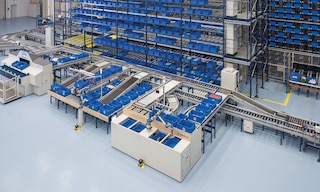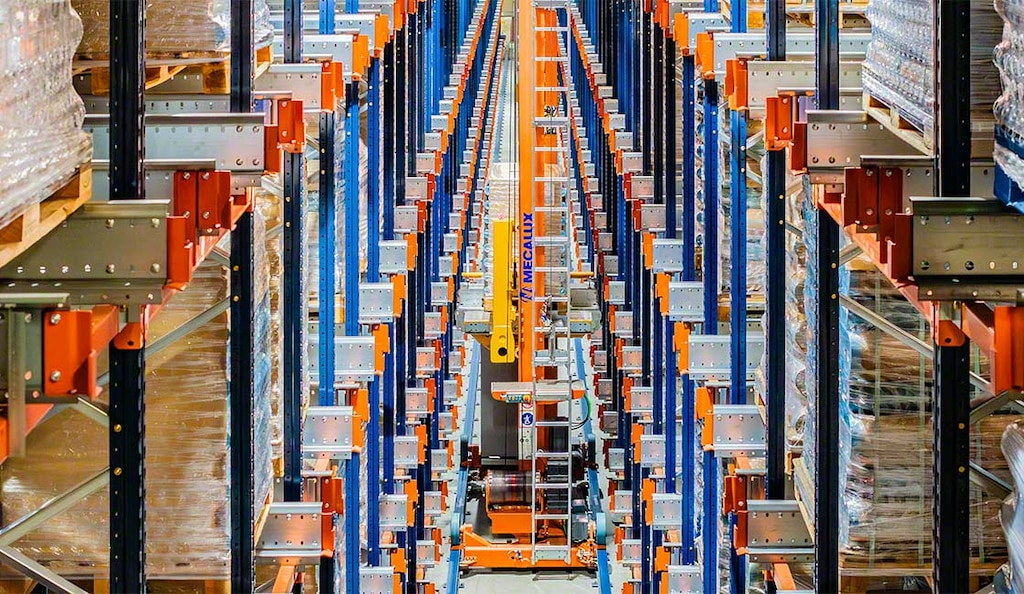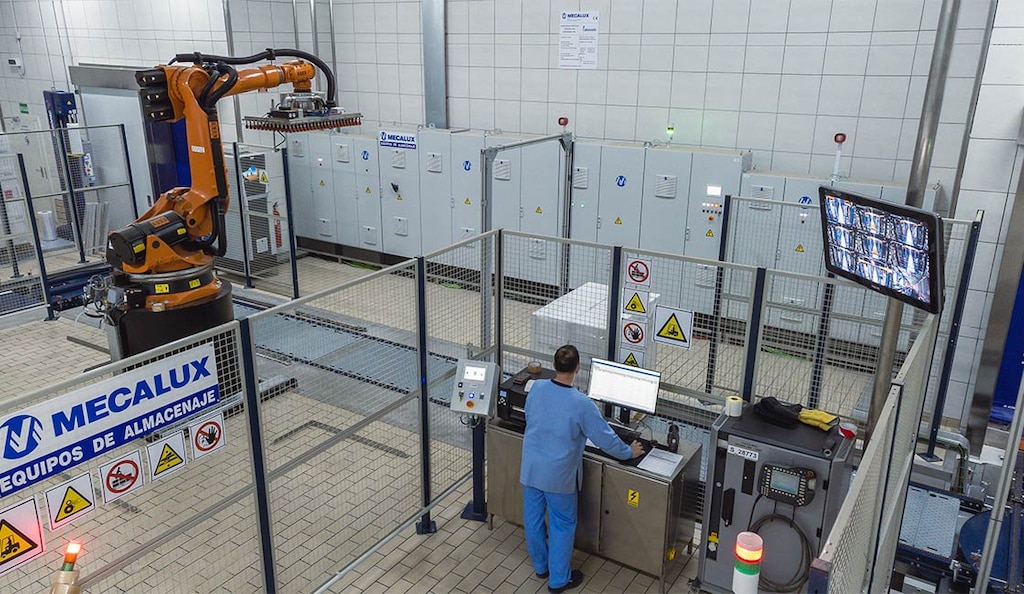
AI in warehouse management: impact and applications
Artificial intelligence (AI) is becoming much more widespread in Logistics 4.0, which involves the digitalization of processes relating to goods distribution.
AI in warehouse management: how is it applied?
Artificial intelligence in the warehouse is common nowadays, but its full-scale application is only just starting to take off. Integrating technologies such as automation and AI in logistics operations brings multiple advantages. They go beyond warehouse automation, which can range from the simplest options to more complex transformations.
These types of solutions use machines such as stacker cranes or motorized shuttles to reduce repetitive tasks, increase agility, and minimize physical strain on operators. An automated warehouse — also known as a smart warehouse — combines robotic and automated elements to replace the most labor-intensive tasks.
How do automation and AI impact warehouse management?
The MHI Annual Industry Report indicates that 74% of supply chain leaders are ramping up their technology investments, with 90% planning on spending over $1 million in this area over the year. More and more facets of logistics can benefit from the use of AI:
- Warehouse automation. Machines that systematize logistics operations are integrating AI-related enhancements. One example is picking robots. Thanks to computer vision, these devices recognize the shapes of objects they’ve never seen before and arrange them as efficiently as possible to fulfill orders.
- Autonomous driving. Autonomous mobile robots (AMRs) move loads between different points of a facility, “making decisions” without the need for predefined routes. These capabilities are enabled by AI and machine learning.
- Planning. AI can make demand forecasting more accurate, avoiding stockouts and cutting costs. It’s also an ally for preparing other supply chain processes.
- Back-office operations. Other departments that manage behind-the-scenes activities for companies — e.g., IT tasks, human resources, and accounting — can also benefit from AI. Cognitive automation, for instance, can be implemented in billing processes.
- Occupational safety and health. According to Yeming Gong, Head of the Artificial Intelligence in Management Institute and the Business Intelligence Center at Emylon Business School, AI contributes to improving workers’ well-being and safety. It does this by assisting them with repetitive tasks and helping logistics managers scale up safety measures in their facilities. AI in warehouse management is also advantageous for preventing risks linked to order picking, sorting, packaging, and similar actions.

How does AI help warehouse management?
Although it requires an initial outlay, employing AI in logistics comes with several benefits:
- 24/7 availability. AI-driven systems need no rest, so they can work uninterruptedly.
- Higher productivity. Machines like picking robots cooperate with humans to boost their work in automated warehouses. If necessary, they can also operate independently.
- Attention to detail. AI’s accuracy in performing tasks results in fewer errors.
- Customer satisfaction. Chatbots respond faster to consumers’ questions and enable tracking of shipments and deliveries. They also enhance the shopping experience by personalizing messages and recommendations.
- Quicker data analysis. AI is capable of processing large amounts of information in a short time. Additionally, it can draw conclusions and make suggestions for optimization.
- Predictive maintenance. Technology makes it possible to detect potential problems before they cause failures. This allows companies to carry out preventive maintenance to ensure business continuity.
- Transportation optimization. Another field where AI is extremely useful is route management. When employing AI in this process, companies take into account factors such as total capacity, weather forecasts, traffic information, and vehicle geolocation. This enables them to reduce travel costs and driving hours while serving customers as quickly as possible.
- Sustainability. Through the use of algorithms, new route planning methods help limit greenhouse gas emissions and the impact of logistics operations.
The future of AI in warehouse management
Experts anticipate that we’re on the brink of a new era for logistics. Supply chains will be transformed as AI technologies become more effective. Eventually, repetitive and physically demanding tasks will be relegated to robots. Then, operators will be able to focus on work that adds greater value. AI will shorten customer service response times and improve the visibility of operations, increasing overall satisfaction.

Steps for implementing AI warehouse management
Before integrating AI in warehouse management, it’s advisable to analyze your company’s capabilities and needs and formulate a plan:
- Establish a strategy. Firstly, think about what you hope to achieve and how you’ll adapt AI to your current processes.
- Find the right type of AI. Several machines and systems already incorporate AI processes. The key is to choose the solution most closely aligned with your business requirements. It should provide the greatest benefit with the smallest investment in time and resources. One example is edge AI, i.e., implementing AI in an edge computing environment. This framework enables devices to make decisions in milliseconds.
- Study how to integrate AI. It’s best to train all employees on managing these technologies. They can be implemented through a pilot project or through small tasks that gradually become more significant.
- Measure improvements. It’s critical to assess performance to obtain the maximum possible throughput.
WMS: the smart warehouse mastermind
If you’re looking to speed up processes in your facility — whether automated or manual — a warehouse management system (WMS) is a must. This software will help you streamline operations and fine-tune processes such as order fulfillment and shipping. The Mecalux Group developed Easy WMS to coordinate teams, inventory, and the workforce from a single digital tool.
Get in touch for information on how to implement this software, which can monitor multiple facilities simultaneously. With our 55+ years of experience in the intralogistics sector, you can count on us to find the solution that best matches your business needs.
